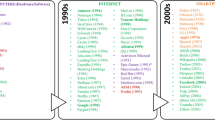Abstract
Digital platforms may yield a host of advantages in putting circular economy into effect. This paper analyses the related chances and discusses requirements of digital platforms for the realization of a circular economy. It specifically points to potential solutions offered by digital platforms for existing barriers. From there it identifies issues that need specific attendance to create economically and ecologically functional platforms. Three economically relevant perspectives are discussed for this: a management perspective, a legislative perspective and a social/systems perspective.
Zusammenfassung
Digitale Plattformen können zahlreiche Vorteile für die Realisierung einer Kreislaufwirtschaft aufweisen. Dieser Beitrag analysiert diese Chancen und diskutiert die zu schaffenden Voraussetzungen. Er weist dabei besonders auf potentielle Lösungen für bestehende Barrieren hin, die aus Sicht der Autoren durch digitale Lösungen besonders gut überwunden werden können. Sodann wird aufgezeigt, dass noch zahlreiche Bedingungen erfüllt werden müssen, damit diese Vorteile auch ausschöpfbar sind. Dabei werden drei ökonomisch besonders relevante Perspektiven behandelt: die Perspektive des Plattform-managements, eine regulatorisch-legislative Perspektive und die Einflüsse auf der sozialen bzw. Systemebene.

Similar content being viewed by others
Notes
Such applications are already taking place in other areas. The most notable and informative stemming from cancer treatment. Here, the ability of digital networks to analyse and process the vast bulk of latest research allows to effectively identifying the most promising treatment for individual patients (Brynjolfsson and McAfee 2016).
Block Chain Solutions currently appear as a means to this end. As platforms for contracts without the need for trust they have been established in banking environments and other applications (Christidis and Devetsikiotis 2016).
References
Akerlof GA (1970) The market for “Lemons”: Quality uncertainty and the market mechanism. Q J Econ 84(3):488
Atos (2016) Journey 2020 digital shockwaves in business. https://ascent.atos.net/journey-2020/. Accessed 8 June 2017
Berkhout PH, Muskens JC, Velthuijsen JW (2000) Defining the rebound effect. Energ Policy 28(6):425–432
Binswanger M (2001) Technological progress and sustainable development: what about the rebound effect? Ecol Econ 36(1):119–132
Brynjolfsson E, McAfee A (2016) The second machine age: work, progress, and prosperity in a time of brilliant technologies. First editon with new introduction. WW Norton & Company, New York
Charter M (2016) Circular economy business models. Sustainable Innovation 2016. Centre for Sustainable Design, Farnham, pp 64–69
Christidis K, Devetsikiotis M (2016) Blockchains and smart contracts for the internet of things. IEEE Access 4:2292–2303
EEA (2016) Circular economy in Europe—developing the knowledge base. EEA Report 2/2016. EEA, Copenhagen
EEA (2017) Circular by design—Products in the circular economy. EEA Report 6/2017. EEA, Copenhagen
Gawer A, Cusumano MA (2014) Industry platforms and ecosystem innovation. J Prod Innov Manage 31(3):417–433
Lacy P, Rutqvist J (2015) Waste to wealth: the circular economy advantage. Palgrave Macmillan, UK. https://doi.org/10.1057/9781137530707
Lieder M, Rashid A (2016) Towards circular economy implementation: a comprehensive review in context of manufacturing industry. J Clean Prod 115:36–51
MacArthur E (2013) Towards the circular economy, economic and business rationale for an accelerated transition. Ellen MacArthur Foundation, Cowes
McAfee A, Brynjolfsson E (2017) Machine, platform, crowd: harnessing our digital future. WW Norton & Company, New York
Morgan J, Mitchell P (2015) Circular economy and employment—job creation in a more resource efficient Britain. http://www.wrap.org.uk/sites/files/wrap/Employment%20and%20the%20circular%20economy%20summary.pdf. Accessed 17 July 2017
Neligan A, Schmitz E (2017) Digitale Strategien für mehr Materialeffizienz in der Industrie: Ergebnisse aus dem IW-Zukunftspanel (No. 3/2017). IW-Report
North DC (1984) Transaction costs, institutions, and economic history. J Inst Theor Econ 140(1):7–17
OECD (2005) Improving recycling markets. Working Group on Waste Prevention and Recycling
OECD (2007) Improving recycling markets. Policy Brief, OECD Observer
Plastics Europe (2016) Plastics—the facts 2016, an analysis of European plastics production, demand and waste data. https://www.plasticseurope.org/application/files/4315/1310/4805/plastic-the-fact-2016.pdf. Accessed 18 July 2017
Reuter MA, Hudson C, Van Schaik A, Heiskanen K, Meskers C, Hagelüken C (2013) Metal recycling: opportunities, limits, infrastructure. A Report of the Working Group on the Global Metal Flows to the International Resource Panel
Rizos V, Behrens A, Van Der Gaast W, Hofman E, Ioannou A, Kafyeke T, Flamos A, Rinaldi R, Papadelis S, Hirschnitz-Garbers, Topi C (2016) Implementation of circular economy business models by small and medium-sized enterprises (SMEs): barriers and enablers. Sustainability 8(11):1212
Roland Berger (2016) Die Digitalisierung in der GreenTech-Branche – Handlungsbedarf für Unternehmen der Umwelttechnik und Ressourceneffizienz in Deutschland
Ross A (2016) Industries of the future. Simon & Schuster, New York
UNEP (2011) Recycling rates of metals—a status report, A Report of the Working Group on the Global Metal Flows to the International Resource Panel. Graedel T E, Allwood J, Birat J‑P, Reck B K, Sibley S F, Sonnemann G, Buchert M, Hagelüken C. http://wedocs.unep.org/bitstream/handle/20.500.11822/8702/-Recycling%20rates%20of%20metals%3a%20A%20status%20report-2011Recycling_Rates.pdf?sequence=3&isAllowed=y. Accessed 18 July 2017
Von Geibler J et al (2015) myEcoCost: Forming the nucleus of a novel environmental accounting system. Vision, prototype and way forward. Wuppertal Spezial, Wuppertal Institut für Klima, Umwelt und Energie, No. 50, ISBN 978-3-929944-97-6. http://nbn-resolving.de/urn:nbn:de:bsz:wup4-opus-60099. Accessed 29 June 2017
Wilts H (2012) The ambiguous relation between waste incineration and waste prevention. In: Karagiannidis A (ed) Waste to energy. Green energy and technology. Springer, London, pp 349–370
Wilts H (2016a) Germany on the road to a circular economy? Friedrich-Ebert-Stiftung, Division for Economic and Social Policy
Wilts H (2016b) Nachhaltige Innovationsprozesse in der kommunalen Abfallwirtschaftspolitik – eine vergleichende Analyse zum Transition Management städtischer Infrastrukturen in deutschen Metropolregionen. Dr. Kovac, Hamburg
World Economic Forum, Ellen MacArthur Foundation, McKinsey & Company (2016) The new plastics economy—rethinking the future of plastics. http://www.ellenmacarthurfoundation.org/publications. Accessed 17 July 2017
Author information
Authors and Affiliations
Corresponding author
Ethics declarations
Conflict of interest
H. Berg and H. Wilts declare that they have no competing interests.
Rights and permissions
About this article
Cite this article
Berg, H., Wilts, H. Digital platforms as market places for the circular economy—requirements and challenges. NachhaltigkeitsManagementForum 27, 1–9 (2019). https://doi.org/10.1007/s00550-018-0468-9
Received:
Accepted:
Published:
Issue Date:
DOI: https://doi.org/10.1007/s00550-018-0468-9




